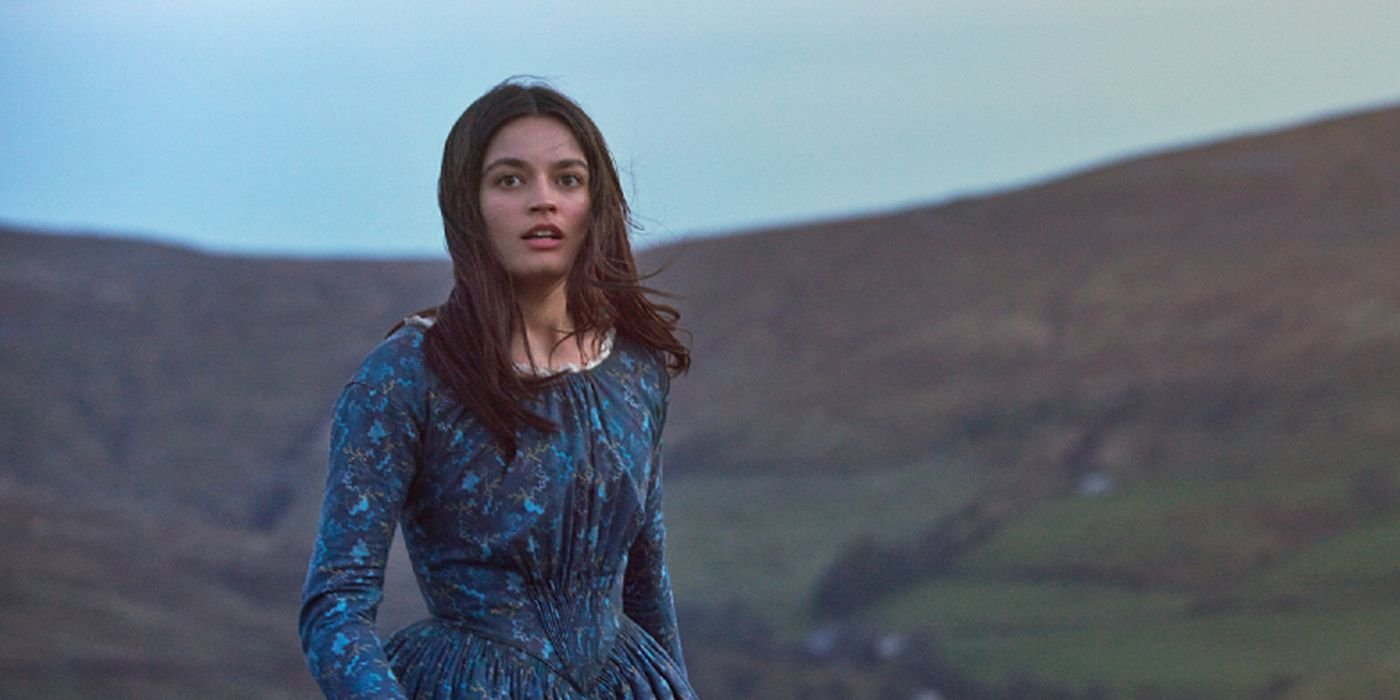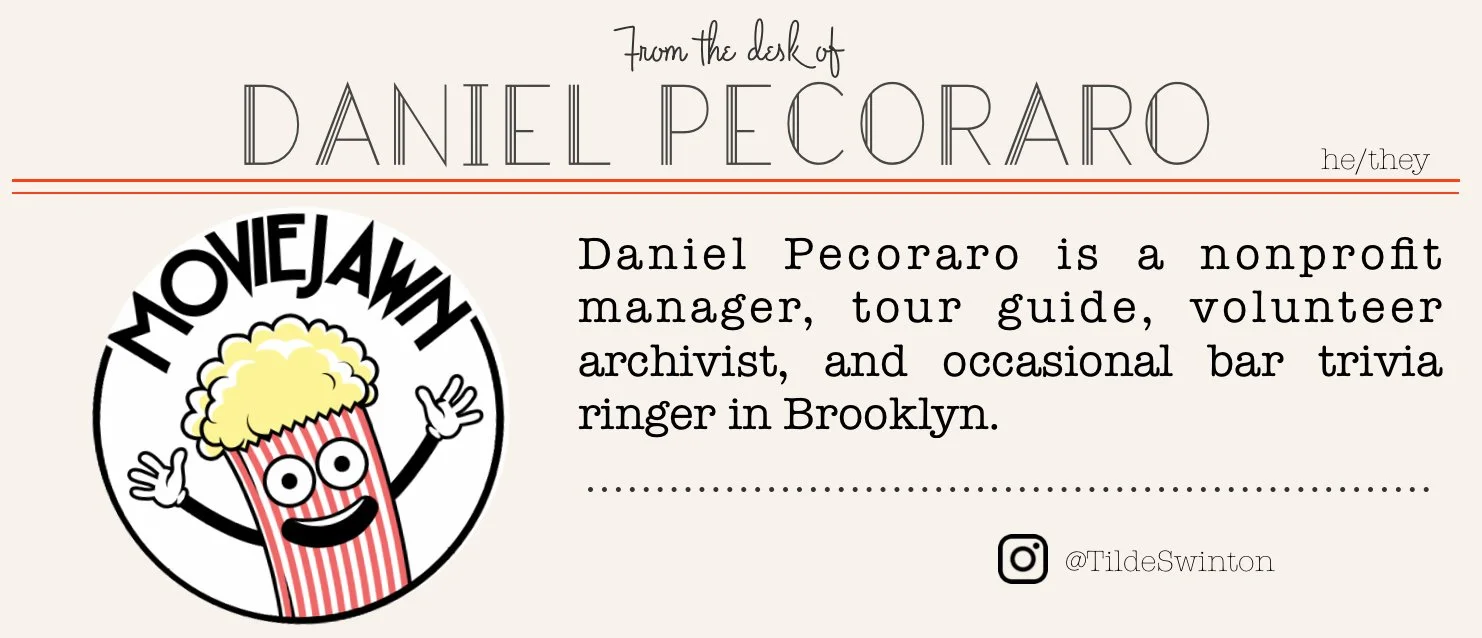EMILY lacks the confidence to make a definitive statement about its chosen Brontë
Emily
Written and directed by Frances O’Connor
Starring: Emma Mackey, Oliver Jackson-Cohen, Fionn Whitehead
Runtime: 130 min.
Rating: R
Opening in US theaters February 17
by Daniel Pecoraro, Contributor
“How did you write Wuthering Heights?” That’s the question that Charlotte Brontë (Alexandra Dowling) asks her dying sister, the eponymous character in Emily, played by Emma Mackey. Coming into this film, I certainly didn’t know the answer. I have little knowledge of any of the Brontës’ oeuvres: I know that they all first wrote under male pseudonyms (which goes unmentioned in the film) and that they all died either young (in the case of Charlotte) or super young (in the case of Emily and Anne, played here by Amelia Gething). What little I know of Jane Eyre comes from A Bit of Fry and Laurie, but I don’t think an extensive knowledge of nineteenth-century English literature is necessary here. Writer and director Frances O’Connor pigeonholes Emily into the roles of tortured genius artist, “I’m not like those other girls” outsider, and survivor of a love affair with a tragic ending.
O’Connor made the surprising choice to center Emily’s relationships not on her sisters, but two men in her life instead. Patrick Brontë (Adrian Dunbar) is the parson in the village as well as a widower and the father to Charlotte, Emily, and Anne, along with eldest child Branwell (Fionn Whitehead). Appointed the new curate to Patrick Brontë, William Weightman (Oliver Jackson-Cohen, who has great hair) is a stranger brought to Haworth, Yorkshire. Weightman’s first sermon on the nature of rain (of which there are buckets in this movie) receives light, polite praise from Charlotte and Anne, but what passes in the early Victorian era for sass by Emily. Emily thinks Weightman is bad news, and she says as much to Charlotte. Soon enough, Emily and Weightman (who is assigned as Emily’s French tutor after she has an emotional breakdown at the school where Charlotte teaches) begin a torrid, lusty affair.
Before that, though, Emily has a kind of radicalization through more time spent with Branwell, whose hard drinking and opium consumption fuel his undistinguished art. Emily, already set apart from her sisters in deportment, willingness to conform, comparable plainness in choice of bonnets, and straight dark hair, becomes even more of a “bad girl,” taking up tobacco smoking, drinking elixir of opium (the source of a few goofy trip scenes), and getting a “Freedom in thought” tattoo to match her brother’s. After Branwell attempts a relationship with a married woman to whose family he’s employed, he’s sent away, leaving Emily only with Weightman for connection as the two horniest young people in northern England.
When she’s not messing around with Weightman or carousing with her brother, Emily struggles to fit in with her sisters and in society, primarily due to the trauma of her mother’s death and what could be described today as her social anxiety. These episodes are depicted as dark or supernatural, as much a motif in the film as Emily and Weightman’s encounters or the scenes of running through a moor, the rain, or a moor in the rain as befitting the milieu of British period pieces.
Perhaps this was why when watching this film that I kept thinking of 2020’s Shirley (dir. Josephine Decker), another entry in the “troubled woman author” genre. But while they share similar color palettes and a willingness to claim artistic license–Abel Korzeniowski’s score is at times reminiscent of Tamar-kali’s for Shirley–Emily lacks a broader emotional depth. The sisters’ storyline is a one-note rivalry between Charlotte and Emily, and Anne gets forgotten about through long stretches of the film. Charlotte’s and Anne’s own works go largely unmentioned, and are only discussed in the context of Charlotte’s abandoning her writing for teaching. (And, reader, I guffawed when the question at the start of the film is answered when Emily is moved to write Wuthering Heights in one sitting, in what amounted to an all-nighter.) Emily and Weightman’s relationship is made up to be a tragic love affair, but it lacks romance. Korznieowski’s score, full of sweeping crescendos, takes big swings that can come off as silly. Also, I’m troubled by the thought that Wuthering Heights was borne out not out of Emily Brontë’s brilliant mind, but because of her time with a fictional dude.
There are some parts of Emily that work. The “mental health episode” scenes hit hard, and Mackey shines, turning in an arresting performance overall. Michael O’Connor’s costume design is intricate, especially those bonnets! But Emily feels almost unsure of itself, whether to move into the supernatural and surreal or the trite and campy. Ultimately, the film feels caught in between and too weighed down by the tired clichés foisted upon the lead character.


